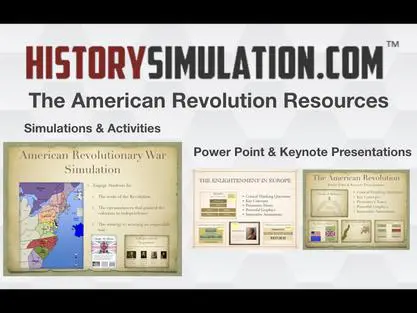THE AMERICAN REVOLUTION FOR KIDS
RESOURCES TO TEACH KIDS ABOUT THE AMERICAN REVOLUTION
It has been called one of the greatest political experiments in World History! The courage, stamina and relentless pursuit of freedom of the American people is reflected in the story of its fight for independence and the government that was developed after the Revolutionary War.
See how the Enlightenment in Europe led to the Declaration of Independence. Then watch as the country fights against the world's superpower and transitions from the Articles of Confederation to the U.S. Constitution.
Study Guide
22.2 The Enlightenment In Europe
The Scientific Revolution prompted new ways of thinking about: Government, Religion, Economics and education. Different political thoughts emerged. Thomas Hobbes believed in the Absolute Power of the ruler. John Locke, who believed that people could learn to govern themselves- Self Government. Voltaire, who used Satire (Humor and Irony) to poke fun at the rulers of his day. Montesquieu's separation of powers to put limits on the ruler. Rousseau believed that people were corrupted by the world. He believed in equality of all men.
22.4 The American Revolution
The American Revolution's origins can be traced directly to the Enlightenment. The theme of no taxation without representation pushes the colonies towards independence. The Navigation Acts and The Stamp Act, fueled anger that led to the Boston Tea Party. The 1st and 2nd Continental Congress sees events moving towards the writing of the Declaration of Independence. Later the forming of the Constitution of the United States and the Bill of Rights.
Study Guide
Links for the American Revolution
1. American Revolution Hollywood Movies
a. Hollywood movies and documentaries about the American Revolution. Please send us any suggestions to add to our list.
2. The American Revolution Pinterest Board
a. Pictures and graphics about the American Revolution.
3. Overview of The American Revolutionary War: American Battlefield Trust
a. A general overview of the Revolutionary War in America between Great Britain and the Americans
4. Myths of the American Revolution: Smithsonian Magazine
a. A noted historian debunks the conventional wisdom about America’s War of Independence: John Ferling
5. Stories From The Revolution: National Park Service
a. This link contains the following information: Timeline of events, The Revolution Day by Day, Revolutionary Stories, Revolutionary People and Revolutionary Links.
a. Battles, People, Events, Timeline and Documents.
7. The Declaration of Independence: The National Archives
a. The following text is a transcription of the Stone Engraving of the parchment Declaration of Independence (the document on display in the Rotunda at the National Archives Museum.) The spelling and punctuation reflects the original.
a. The American Battlefield Trust is America's largest non-profit organization (501-C3) devoted to the preservation of our nation's endangered Civil War, Revolutionary War, and War of 1812 battlefields. The Trust also promotes educational programs and heritage tourism initiatives to inform the public of the wars' history and the fundamental conflicts that sparked it.
9. Journal of The American Revolution
a. Journal of the American Revolution is the leading source of knowledge about the American Revolution and Founding. We deliver America’s most important history straight to your inbox.
10. American Revolution Museum
a. Explore the Museum from anywhere at any time with free digital resources for all ages, including a Virtual Museum Tour, a Virtual Field Trip, a rich archive of Read the Revolution book excerpts, a digitized collection of the Museum's art and artifacts, and more.
11. Livestreams from Monticello
a. Livestreams about Thomas Jefferson and his life from Monticello his home.

